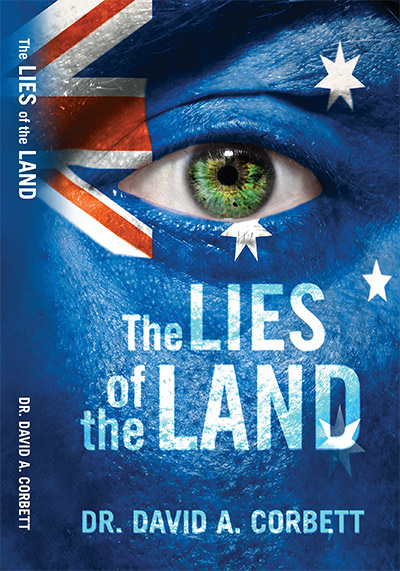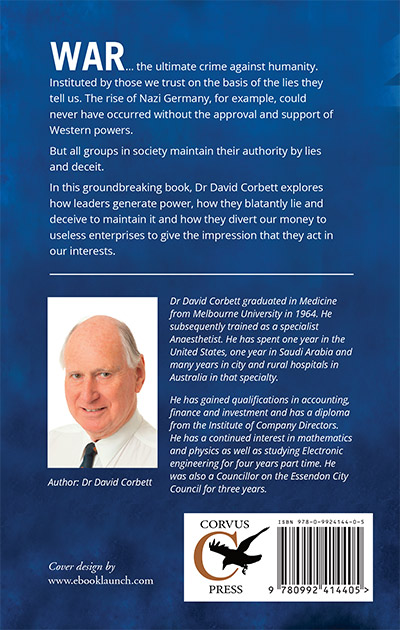The LIES of the LAND
$15.00
In his novel, Candide, Voltaire maintained that we
presently live in the best of all possible worlds – under
the circumstances. Now, a cursory look around us tells us
that all is not well in the state of Denmark. We have wars,
famine, fire and floods; we have obscene wealth living
cheek by jowl with abject poverty; we have young folk
wasting or destroying their lives with drugs in back alleys,
or in cars on our roads.
Description
Part 1
Let’s start this chapter on Good and Evil with an example.
You and I go to an art gallery to look at a painting of a woman that has been recommended to us.
I believe that the image of a woman is quite beautiful but you think otherwise. How can this be? How can a painting be both beautiful and ugly at the same time? The answer leads us into the depths of philosophy that has been argued for over 2,500 years.
It brings us to the concepts of subjectivity and objectivity. An object is the same object no matter who looks at it. A picture is a picture. But if I now describe it as a ‘beautiful’ picture, I am investing it with a quality it does not inherently possess — I am making a subjective evaluation.
Words can have two meanings: a technical and an emotional meaning. Let us examine two statements:
- ‘I am a devout Christian.’
- ‘He is a Muslim fundamentalist.’
Both refer to individuals who take their religion seriously and, on the surface, the statements have no
technical difference in meaning except that one is a Christian and one is a Muslim. But the emotional impact of each statement is entirely different, isn’t it? In the first statement, I am putting myself forward as a normal upright citizen whom you can trust. In the second statement, I am
inviting you to be careful of a person who is dangerous and who might cut off your hands if you inadvertently pick up his lunch box.
This exemplifies the danger of not being aware when subjective statements are made. Whenever faced with a statement that creates an emotional response, be very alert to the possibility that it is subjective. The purpose of subjective statements is to precondition people to come to a desired conclusion without offering any proof. Once you have heard and accepted without question that a person is a ‘Muslim fundamentalist’, it is now dead easy to convince you that he or she should be arrested, held without trial and that they should have no right to the normal processes of justice.
This injustice is bad enough but it has even more serious repercussions: once you are convinced of the dangers of the ‘Muslim fundamentalist’, there is no problem to induce you to join the army and go off to foreign lands to kill such dangerous people. And you are prepared to do all of this without one skerrick of evidence.
In “The Republic”, Plato discusses good and evil at some length. He starts with the proposition that I would define a good man as one who looks after my interests and harms my enemies. But what
about my enemy? A good man to my enemy is one who would harm me. In fact, whether a man is bad or good is entirely subjective and dependent upon the point of view of the person making the judgement.
Part 2
The French philosopher Michel de Montaigne (1533–1592), maintained that much education consisted of teaching knowledge rather than wisdom. In this respect, he categorised ‘knowledge’ as fact, but ‘wisdom’ as the ability to understand and use those facts. Even though we have had some four centuries to heed his advice, our education system today has not advanced beyond the state
that existed in his day.
We rarely teach our children how to use the information they acquire. We instil rules and customs
without explaining the reasons for such things. If you know what your goal is, you can work out many different methods to arrive at that goal. If you do not know what the purpose of your learning is, you will not know how or when to apply it.
We wonder why so many young people die on our roads. The rate of road deaths of those under 25 is about double that of those over 25. Because children have rules and restrictions imposed upon them for no apparent reason, they later tend to rebel against what they regard as tyranny without purpose. When they get to drive a car by themselves, they are now freed from this tyranny and are able to do as they like. They do not realise that the road rules are designed to protect rather than tyrannise them because no one has bothered to tell them. Hence, they deliberately disobey the rules with the common consequence of injury or death. Teaching young people the mechanics of driving without teaching them how and why to drive carefully is like teaching someone how to shoot a
gun without teaching him how to use it safely.
Schools and the education system did not originate to teach students to think or to understand. They began as parish schools to inculcate religion. If you only want children to believe what they are taught, debate is a big disadvantage. This historical system of teaching remains today, so we have an adversarial system of education. Education becomes a system of hurdles to be conquered, while the teachers are viewed by the student as obstacles rather than allies
Part 3
The Western powers (Britain, France and the USA) had large financial interests in Russia at the time. Thus, they were less than amused by the state of play in Russia and certainly did not want anyone to get the impression that the hoi-polloi should be allowed to run any country. They therefore lent support to the White Russians in the hope that they would regain power for the proper ruling class.
In April 1920, Poland invaded Russia with the backing of Britain and France. David Lloyd-George, the British Prime Minister at the time, ordered a shipload of arms to be sent to Poland to support this invasion. However, the British dock-workers refused to load the ship, which happened to be aptly named ‘The Jolly George’.
In August 1920, the Red Army drove the Polish invading forces back to its own borders. Lloyd-George now threatened to send troops to aid the Poles. However, the British Labour Party and the Trade Unions organised a ‘Council of Action’, which had the power to call a general strike if British forces attacked Russia. This presented Lloyd-George with a problem. The term ‘Soviet’ is Russian for ‘council’ or ‘worker’s council’. The trade union ‘Council of Action’ was starting to look dangerously like the advent of Socialism into Britain itself. Lloyd-George obviously came to the rapid conclusion that further provocation might be unwise.
Also during 1920, the French fleet mutinied in the Black Sea to stop French intervention against the
Bolsheviks. Mutiny is not something a military person undertakes lightly so the French government presumably came to the same conclusions as Lloyd-George.
Hitler had always maintained that the German people needed more living space (Lebensraum) and had made no secret that he felt the best open space lay to the east. What more could a British and French government ask for than a conquered nation being prepared to risk the lives of its people to get rid of an unwanted Russian government? And at no cost to the British or French either.
Hitler was the answer to a maiden’s prayer.
Available at :
*Price may vary by retailer
Get a FREE ebook by joining our mailing list today!
Lorem ipsum dolor sit amet, consectetur adipiscing elit.







Reviews
There are no reviews yet.